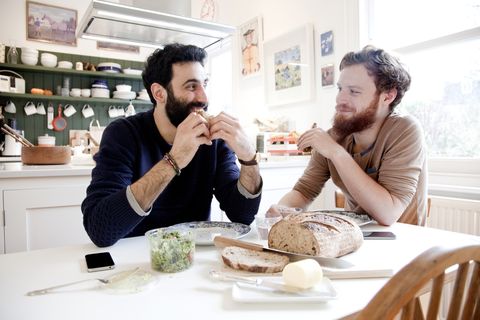There’s a lot to love about exploring a budding romance with a new partner, like the butterflies in your stomach every time you see them and the fact that you can’t keep your hands off each other, no matter how hard you try. But if there’s one thing that often sucks about being at this stage, it’s the looming pressure to define the relationship, or DTR—otherwise known as having the infamous “Talk.” You know, the inevitable point in the early stages of seeing someone where you or your partner asks, “So what are we?”
If things have been going swimmingly so far, it can be scary to try to answer that question. What if it turns out one person wants a committed relationship, but the other wants to keep things casual? Do you keep seeing each other, hoping one person will come around, or do you break up then and there? If you’re polyamorous, defining the relationship comes with the additional logistics of establishing what commitment looks like to each of you.
It’s a complicated conversation that carries a lot of weight, so we enlisted the help of sexologist Marla Renee Stewart, MA, and Kevin A. Patterson, M.Ed., author of Love’s Not Color Blind, for tips on how to do it successfully.
When should you have the DTR talk?
Somewhere between three months and a year is a good time to define your relationship with someone, according to Stewart. “By the time the year mark comes around, you generally have known that person for a good amount of time to see if you want to be with them for a longer period,” she says. That said, if your logic and emotions tell you the other person is right for you, it’s okay to have the talk sooner. It’s really about feeling it out.

How do you do that, exactly? Here’s one way: “You should have the talk at the point of expectation,” Patterson says. “If you’ve got a free night and wordlessly expect that your person will spend it with you, have the talk.”
In other words, if you would be hurt to find out your partner is still dating and sleeping with other people—and you want to spend more time with them—HAVE THE TALK.
What should you say when you define the relationship?
Find a time when neither of you is stressed or has anywhere to be, and say, “Hey, I’d like to have a more serious talk with you. Is now a good time?” (Having the talk in person is ideal, but if you’re quarantining separately, FaceTime works, too.) If they’re free, say something like: “So, we’ve been dating for a number of months now, and I like you a lot. I’ve really enjoyed spending time with you, and I’d like us to be more officially committed. Do you want to be my girlfriend/boyfriend/partner?”
If your partner agrees (yay!), “You need to talk about what kind of relationship style you’d like to have,” Stewart says. Do you (or they) want an open relationship, polyamorous relationship, or a monogamous relationship? Commitment doesn’t look the same to everyone.
“You should also address your strengths, as well as your flaws, and what you’re trying to work on with yourself,” Stewart adds. Suppose you’re someone who gets jealous when your girlfriend hangs out with male friends. You need to let your partner know this—not for the sake of discouraging them from speaking to other guys platonically, but to explain that this is something you struggle with and are currently working on. If you really do like them, then it’s only fair you give them the information they need to make an educated decision about whether you two are compatible. And hey, they may take note of your vulnerability and realize you’re even sexier than they realized!
“You should also talk about rules and boundaries and what cheating looks like for both of you,” Stewart says. Is it cheating to flirt with another person? How about dancing with someone else? Does sending nudes to someone else count as cheating? What about accepting nudes? How about watching porn? Can they still be on Tinder? Cheating looks different for everyone, so you need to clarify what it is you’d feel comfortable with your partner doing.
“It’s also super important to talk about what to do if either of you are feeling frustrated or unfulfilled with the relationship,” Patterson says. It may seem slightly premature, but he notes that it’s easier to have a conversation now—while things are going well in your relationship—than before you reach “a crisis point.”
You don’t have to plan for every possible scenario, but you should say something like, “I know we agreed to be monogamous, but if you ever feel like you’re not getting your romantic or sexual needs met, please talk to me about it. Maybe we open up the relationship, go to couple’s therapy, or we figure something else out. I don’t want you to remain silent if you’re not feeling fulfilled and grow to slowly resent me.”
What should you do if you want to be exclusive and the person you’re dating does not?
“Listen to them,” Patterson says. “A person who says they don’t want exclusivity isn’t asking to have their mind changed.”
So, if you really want commitment, and they make it clear that they don’t, then it’s time to move on. Don’t refuse to accept their rejection because you think persistence is romantic. It’s actually scary!
“It’s no crime to want two different things,” Patterson says.
That said, they may say they’re “not ready,” which is a different response than not being interested at all. Some folks need a little bit more time to “know” if they want to commit. This situation is trickier to navigate. Some people say it and mean it, whereas others say it indefinitely, stringing you along for as long as they can. You don’t want to be in a situation where you’ve been together for two years, and they’re still not wanting to commit.
“If you think they’re worth the wait, then you might want to set a time limit for yourself and if they don’t want to be exclusive by that time, you should be moving on and being with someone who really wants to be with you in the way that you want to be with,” Stewart says.
We know the conversation can be stressful and awkward. We know that you’re putting yourself on the line by being vulnerable, and you’re opening yourself up to heartbreak, but just remember the end result makes the talk worth it. As the saying goes, “It’s better to have loved and lost than to never have loved at all.”
Source: Read Full Article



